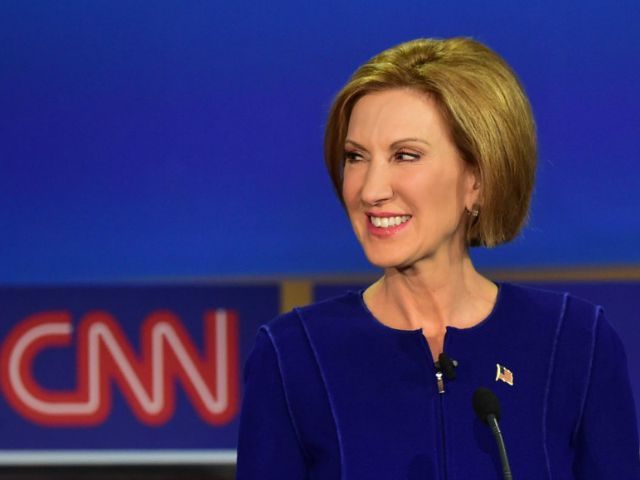Fox News’s media reporter Howard Kurtz has weighed in on a fact-check published last week by the Washington Post and declared it a “misfire.”
The fact-check in queston was about Carly Fiorina’s work history. Fiorina has claimed several times she went from secretary to CEO, shorthand for her rise in the business world. In their fact-check last week, the Post awarded “Three Pinocchios” to that claim, saying it was “bogus.” Kurtz looks at the same facts and says the Post’s fact-check deserves “Four Pinocchios.”
Breitbart News published a lengthy response to the fact-check last on Friday. Over the weekend, the Post, to its credit, added an update to its fact-check, linking to Breitbart’s response:
(Update: This column generated criticism from many readers who said that her statements were entirely factual, as she once was a secretary, and thus were not worthy of Three Pinocchios. John Sexton of Breitbart wrote a critique in which he said the column was “poorly reasoned.” Fiorina herself said the column was “ludicrous” and “sort of floored me.” In determining the rating, we tried to be consistent with other cases when a politician would use words that, while on the face accurate, gave a misleading picture. A good example is the Three Pinocchio rating we gave President Obama’s campaign in 2012 for a campaign video narrated by Tom Hanks, concerning his mother’s fight with an insurance company. That column also generated criticism, though mainly from Democrats. We strive for consistency in how we apply these ratings. In this case, Fiorina’s career really began after she received her MBA, when she was hired as an AT&T sales representative. We did not, as Fiorina falsely claimed on “Meet the Press,” assert she was not a secretary.)
While this does give readers an opportunity to hear another perspective, it doesn’t really respond to some of the specific criticisms made in the piece. For instance, the fact that Fiorina’s biographer (a book the Post linked to support it’s claims) labels the receptionist job her “first taste of business.” That seems to support the idea it was her start, as Fiorina herself claims, but the Post doesn’t quote this line from the book.
In addition, the Post claims to be fact-checking three specific quotes and faults Fiorina for not highlighting the role grad school played in her rise in those quotes. However, one of the three quotes comes from an older campaign biography in which her undergraduate and graduate schooling was mentioned in the very first sentence. The Post skips over this and only quotes the second line of the bio. When I asked Glenn Kessler, the Post’s lead fact checker, about this on Sunday, he first suggested the biography was misleading because it was not chronological:
And this really brought us to the crux of the matter (it was a 2 hour long discussion on Twitter). Having confronted the facts—Fiorina was a secretary during college and for several months after college, she thrived in the job and moved up quickly according to her old boss, she considers it the start of her business career—Kessler simply says no.
It was actually several months, not a few weeks. Kessler then raised this counter-example:
Obviously that would not count as a start to a career in journalism. However, Kessler himself once claimed an even more humble start to his career in a 2011 interview with Brian Lamb of C-Span. Lamb asks, “How did you get into this in the beginning in your life? The whole business of journalism?” Kessler replies, “You know, I knew I wanted to be a journalist from when I was a fifth grader. I always wanted to be a journalist.” Kessler goes on to say:
Interestingly when I was a fifth grader, I produced a newsletter for my neighborhood which I titled, “The Cincinnati Fact”, because I was interested in the facts… even though it was a newsletter for only a few blocks in the neighborhood, I guess grandly called it the “Cincinnati Fact”.
Obviously, Kessler was not claiming anyone gave him a real job at a real paper because of his work on the “Cincinnati Fact.” But he is making a point about his humble beginnings. Looking back, Kessler sees a moment when he first set his mind on a particular career, and that point comes long before his first job after grad school. At an age when most kids were still thinking about being football players or ballerinas, he was thinking journalism and he stayed focused on that goal and worked his way up.
In one sense, Fiorina is also pointing back to a humble beginning that, on its own, would not have taken her to CEO of HP (or anywhere else probably). But, unlike Kessler, Fiorina is not pointing back to her first lemonade stand. She is pointing to an actual job as a secretary/receptionist which she took after dropping out of law school. According to her (and her biographer), it was her “first taste of business.” Though she was only there a few months, she excelled and more or less wowed people she worked for, moving quickly from typist to helping shape big-money deals. And today she says that was the real moment her career began.
Howard Kurtz is right that the facts support Fiorina’s claims and don’t support the Post’s ruling. And if Kessler himself can answer a question about how he got his start in journalism by pointing to a newsletter he produced for the neighborhood when he was 10, maybe he ought to allow a little leeway to others who don’t date the start of their career to their first big job after graduate school.
